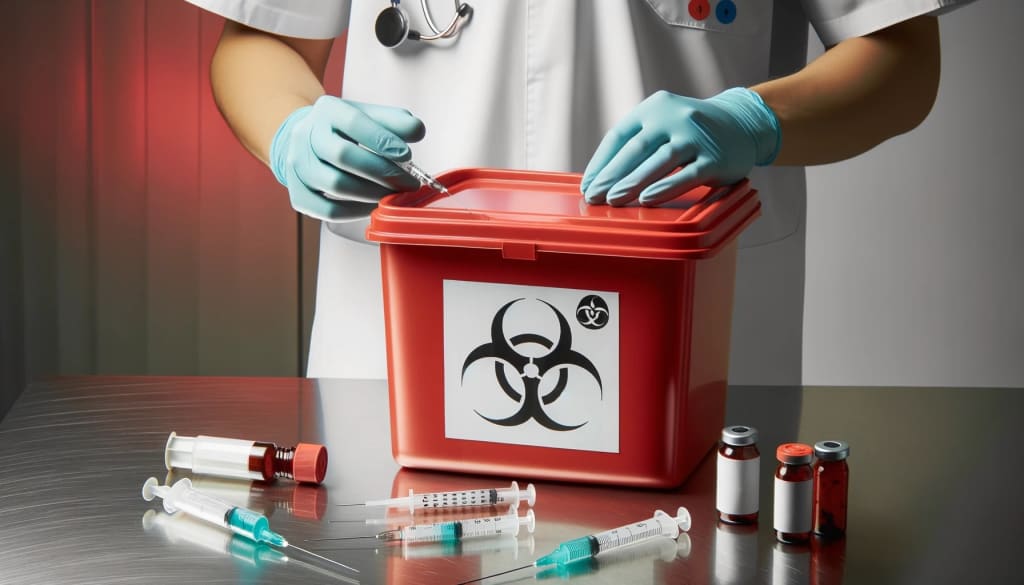How Do Hospitals Dispose of Blood?
How Do Hospitals Dispose of Blood?

When you think of a hospital, you might picture bustling hallways, doctors in white coats, and state-of-the-art medical equipment. However, behind the scenes, there's a critical aspect of hospital operations that ensures patient safety and public health: the disposal of blood and blood products. Proper blood disposal with all the clinical waste removal is essential to prevent the spread of infections, protect healthcare workers, and comply with stringent regulations.
This blog delves into how hospitals manage this vital task.
Understanding the Need for Proper Blood Disposal
Blood disposal in hospitals is a critical component of healthcare waste management. Blood and blood products, if not disposed of correctly, can pose significant health risks. They can carry pathogens, including HIV, hepatitis B, and hepatitis C, which can be transmitted to humans. Therefore, proper handling and disposal are not only necessary for hospital hygiene but also for preventing potential outbreaks of infectious diseases.
Tips for Successful Blood Disposal by Hospitals
Significant ways to dispose of blood include:-
Regulations Governing Blood Disposal
Hospitals must adhere to strict local, national, and international regulations regarding the disposal of blood and other biohazardous materials. In the United States, for instance, the Occupational Safety and Health Administration (OSHA) and the Environmental Protection Agency (EPA) have established guidelines to ensure the safe disposal of medical waste. These guidelines dictate everything from the type of containers used for blood disposal to the methods of transportation and final disposal.
The Blood Disposal Process
The process of blood disposal in hospitals involves several critical steps:
Segregation:
Blood and blood products are first segregated from other types of medical waste. The need for particular handling techniques when dealing with blood waste makes this imperative. Blood waste is usually collected in red biohazard bags or biohazard symbol-labeled containers.
Containment:
Once segregated, the blood waste is placed in leak-proof, puncture-resistant containers. These containers are usually made of durable plastic and have secure lids to prevent any spills or leaks.
Storage:
The sealed containers are then stored in designated biohazard waste storage areas within the hospital. These areas are usually temperature-controlled to prevent the growth of pathogens and are accessible only to authorized personnel.
Transportation:
Specialized medical waste disposal companies transport blood waste from hospitals to treatment facilities. The vehicles are designed to prevent any leaks or spills and are operated by trained personnel.
Treatment:
At the treatment facility, the blood waste undergoes a sterilization process to neutralize any pathogens. Common sterilization techniques include cremation, which involves burning the waste at high temperatures, and autoclaving, which exposes the waste to saturated steam at high pressure.
Disposal:
Sterilization renders the waste non-infectious, allowing for safe disposal. Depending on local regulations, the treated waste might be sent to a sanitary landfill, or it might be further processed into ash and used as a material for construction or other purposes.
Modern Innovations in Blood Disposal
Advancements in medical technology and waste management have led to innovative methods for disposing of blood and blood products. For instance, some hospitals use advanced autoclaving systems that can handle larger volumes of waste more efficiently. Additionally, microwave treatment is emerging as a viable alternative to traditional methods. This technique uses microwave radiation to heat and destroy pathogens in the waste, providing a faster and more energy-efficient solution.
Challenges and Considerations
Despite the stringent protocols and advancements in technology, hospitals still face several challenges in blood disposal:
Cost: The disposal process can be expensive, particularly for hospitals that generate large volumes of blood waste. In addition to treatment and disposal, the expenditures also cover transportation and specialized containers.
Training: Ensuring that all healthcare workers are adequately trained in handling and disposing of blood waste is crucial. Regular training and updates on best practices are necessary to maintain compliance and safety.
Regulatory Compliance: Maintaining compliance with the ever-changing standards might be challenging. Hospitals must stay informed about changes in local, national, and international guidelines to ensure ongoing compliance.
The Role of Healthcare Workers
Healthcare workers play a pivotal role in the safe disposal of blood. From nurses and doctors to janitorial staff, everyone involved in the process must be vigilant and adhere to established protocols. Proper training and awareness programs are essential to equip healthcare workers with the knowledge and skills they need to handle blood waste safely.
To Wrap Up
The disposal of blood in hospitals is a complex but essential process that ensures the safety of patients, healthcare workers, and the general public. By following stringent regulations and adopting modern technologies, hospitals can adhere to effective clinical waste management. While challenges remain, continuous advancements and robust training programs will help healthcare facilities navigate these obstacles, ultimately contributing to a safer and healthier environment for all.
About the Creator
Enjoyed the story? Support the Creator.
Subscribe for free to receive all their stories in your feed. You could also pledge your support or give them a one-off tip, letting them know you appreciate their work.





Comments
There are no comments for this story
Be the first to respond and start the conversation.